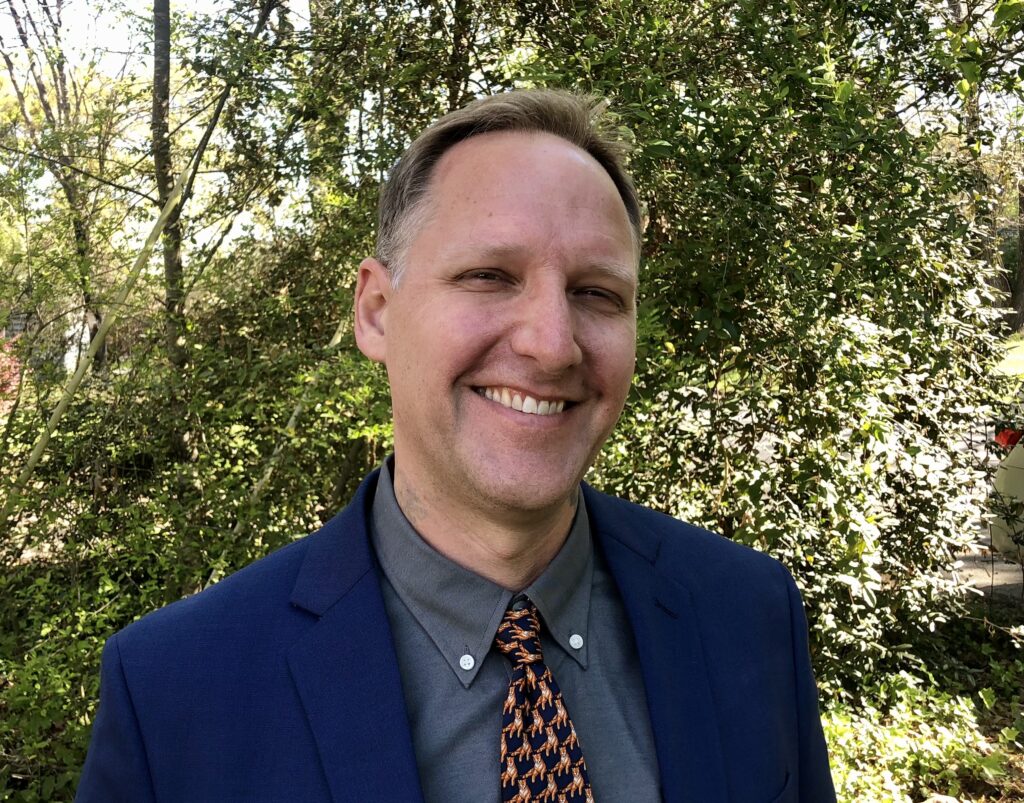George Edwards
John Bailey, the Executive Editor at the Rome News-Tribune, joins panelists for the session on Career Success in an Evolving Media Landscapefor University of West Georgia’s 41st Annual Media Day on March 8.
After starting out at the RN-T as a beat reporter in 2007, Bailey has held the Executive Editorial role since 2018.
“I like to call it a battlefield promotion,” says Bailey. “People left, and you just get ranked up and you get ranked up.”
As a beat reporter, Bailey specialized in Crime and Courts. “The first day off the rip, we go into a really complex federal drug trafficking trial,” Bailey says. “It was one of the couriers, and the main guy–who had flipped and talked to the feds–about this one guy who had been selling crazy expensive horse tranquilizers out of Hiram.
“I could just sit here and talk for a couple hours about the hundreds of crazy stories involved in this one thing,” says Bailey. “I still to this day, if I get a chance and I can go cover a court case I love to do it. As a writer, as somebody who is a communicator, watching the arguments form and watching the back and forth in a courtroom–and then having to relate that to someone–is challenging, it’s interesting.”
Bailey graduated from Georgia Highland College and Shorter University. He once worked in the tech sector–hated it–and then worked construction among other jobs before returning to school. He graduated with a general diploma from the highlands with a degree in Public Relations.
“I would say, if you want to get into this field: Internships,” said Bailey. “That way you get that hands on experience and you decide ‘Hey, man, I don’t like this–or I love it–or I want to try it some more.’”
Throughout his years in journalism, Bailey has seen the acceleration of internet news throughout the 2010s. When he began his career, the field was print focused and digital was a “side thing” but now there is far more flexibility digitally.
“Just to take one very small part–headlines, for example–print headlines had to be very concise,” continues Bailey. “A digital headline can be a sentence or two, where you’re trying to convey ‘this is what I want you to see in order for you to read it.’”
With the explosion of social media in recent years, journalism, and public discourse in a broader sense has found itself undergoing a massive transformation.
“How people’s attitudes have changed with the advent of social media, I like to call it the ‘bulletproof effect,’ or the ‘you can’t punch me in the mouth because I said this’ effect,” says Bailey. “Twitter, for example, if you get out there and you’re a jerk–you get pushed out there a lot more.
“It could be, and should be, such a great thing,” says Bailey. “People being able to have their voices heard through non-traditional methods–not just through a newspaper.“
Social media should be, and could be, such a great thing–and the problem is, at this point I don’t think it is,” continues Bailey.
“My advice would be, you have to read critically, and that’s not always easy to do,” Bailey says. “You have to choose what you view critically–you can get on TikTok and scroll through videos, and goof off, same thing with Twitter, Facebook, Instagram, you name it–but as you consume information you do need to read it critically.”
Bailey recommends consuming information critically. When learning about new topics, it’s more important to look at the source and especially at peer-reviewed articles, something vital to legitimate journalism.
“Depending on how deep I’m going, but I’ll look for news organizations that I have developed a trust in–many of those are legacy: New York Times, Washington Post, even newer ones like Bloomberg,” says Bailey. “You can read it; they cite their sources–this is a big thing–are they citing their sources?”
However, television news is a mixed bag in Bailey’s eyes.
“I guess, Infotainment, they’re trying to shock you and make you angry–I get where they’re coming from–they do make money off it, I think that type of thing as a general news source is bad for you,” Bailey says. “CNN, Fox, all these large news networks–they have solid news stuff–but once you get onto the TV network it’s primarily opinion because they have to fill space and they have to fill time.”
In short, Bailey stresses the importance of careful media consumption.
“We need to be talking to each other, we need to be communicating,” says Bailey. “We need to really be considering what we want as people, and what we want as a state, as a country, as a college.”
You may also like
-
UWG’s Ingram Library Hosts Pop-Up Study Spot to Help Students Prepare for Finals Week
-
UWG Offers Mental Health Support And Academic Services To Maintain Student Success During Finals Week
-
UWG Alumnus Shares His Experience Exploring the Underground Flood Channels of Las Vegas
-
Georgia Students Simulate the Struggles of Dementia
-
UWG PR Students Score a Georgia Power Tour at Atlanta Corporate Office
